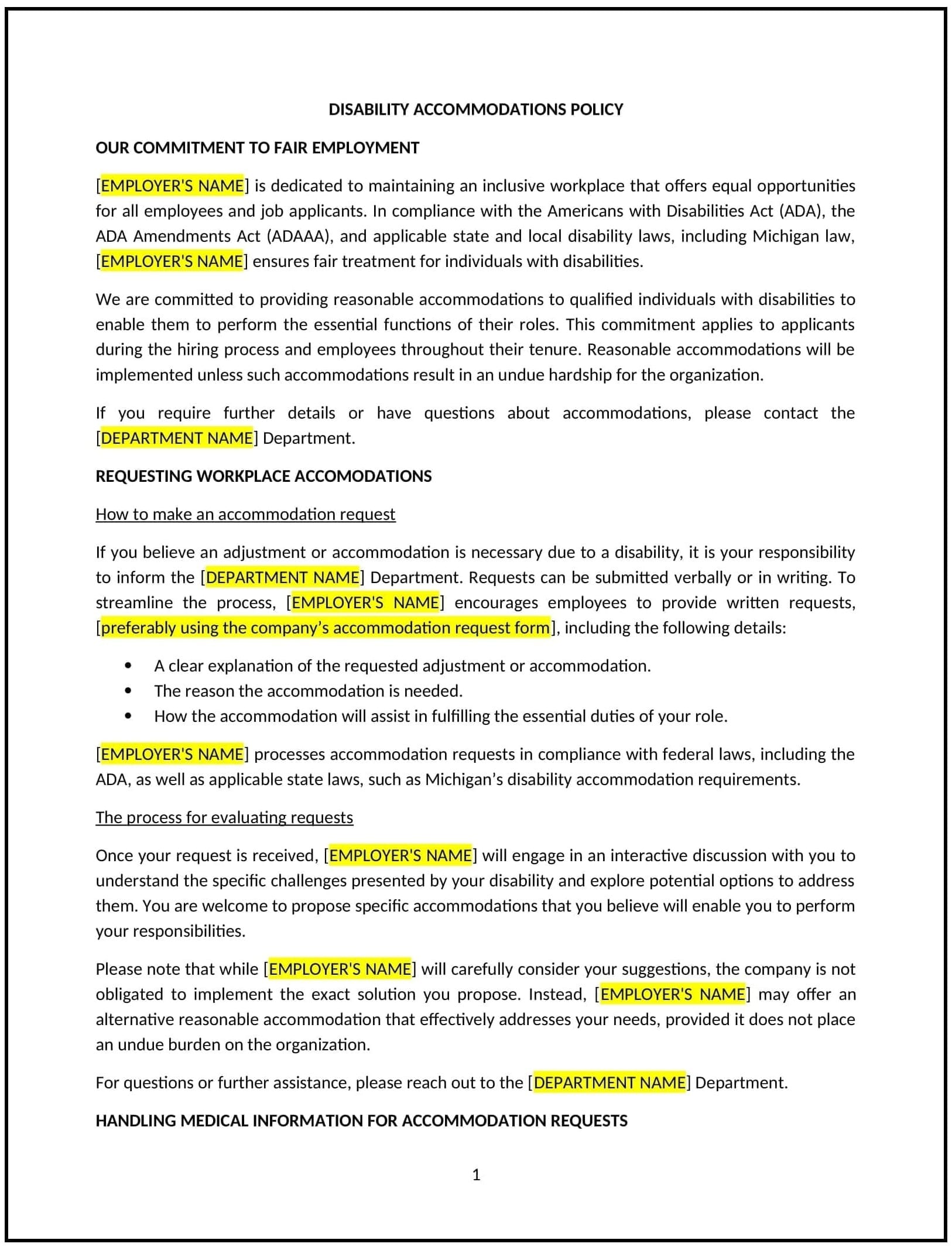Disability accommodations policy (Michigan): Free template
Got contracts to review? While you're here for policies, let Cobrief make contract review effortless—start your free review now.

Customize this template for free
Disability accommodations policy (Michigan)
A disability accommodations policy provides Michigan businesses with guidelines for accommodating employees with disabilities, ensuring that they can perform their job duties effectively while maintaining a safe and inclusive work environment. This policy outlines how businesses can provide reasonable accommodations to qualified employees with disabilities, in compliance with the Americans with Disabilities Act (ADA) and Michigan state laws.
By adopting this policy, businesses can foster a more inclusive workplace, improve employee satisfaction, and reduce the risk of legal issues related to disability discrimination.
How to use this disability accommodations policy (Michigan)
- Define disability and accommodation: Clearly define what constitutes a disability under Michigan state law and the ADA, and outline what types of accommodations may be provided, such as modified work schedules, assistive technologies, or changes to the work environment.
- Set the request process: Establish a clear process for employees to request accommodations, including whom to contact, what information is required, and any necessary documentation, such as a medical note or assessment.
- Determine reasonable accommodations: Specify the types of accommodations that will be considered reasonable, taking into account the business’s operational needs, employee’s job duties, and any potential impact on the business.
- Address interactive process: Implement an interactive process to engage employees in discussions about their needs, how accommodations can be provided, and any alternative accommodations if the requested accommodation cannot be met.
- Ensure confidentiality: Emphasize the importance of maintaining confidentiality regarding employees’ medical conditions and accommodation requests, sharing information only with relevant personnel.
- Evaluate accommodations regularly: Set procedures for periodically reviewing accommodations to ensure they remain effective and that the employee’s needs are being met as their condition evolves.
- Specify the consequences of non-compliance: Clearly outline the potential consequences for failure to comply with the policy, ensuring that employees and management understand the importance of meeting accommodation requirements.
Benefits of using this disability accommodations policy (Michigan)
This policy provides several key benefits for Michigan businesses:
- Promotes inclusivity and diversity: Provides employees with disabilities the support they need to succeed, fostering a diverse and inclusive workplace.
- Reduces legal risks: Helps businesses comply with Michigan state laws and federal regulations, such as the ADA, reducing the risk of legal claims or lawsuits related to disability discrimination.
- Enhances employee retention: By offering accommodations, businesses show that they value employees’ contributions, improving job satisfaction and employee retention.
- Increases productivity: Employees who receive appropriate accommodations can perform their job duties more effectively, increasing overall productivity.
- Demonstrates corporate responsibility: Businesses that implement accommodations demonstrate their commitment to supporting all employees and creating an equitable work environment.
Tips for using this disability accommodations policy (Michigan)
- Communicate the policy: Ensure that employees are aware of the disability accommodations policy by including it in the employee handbook, during onboarding, and in training sessions.
- Be proactive in offering accommodations: Encourage employees to request accommodations early, and be proactive in discussing potential accommodations before challenges arise.
- Foster an open and supportive environment: Create a culture where employees feel comfortable requesting accommodations without fear of discrimination or retaliation.
- Provide training: Train managers and HR staff to handle accommodation requests professionally and respectfully, ensuring they understand the legal requirements and process for providing accommodations.
- Review periodically: Regularly review the policy to ensure it remains compliant with changes in Michigan laws, federal regulations, and any evolving needs within the workplace.